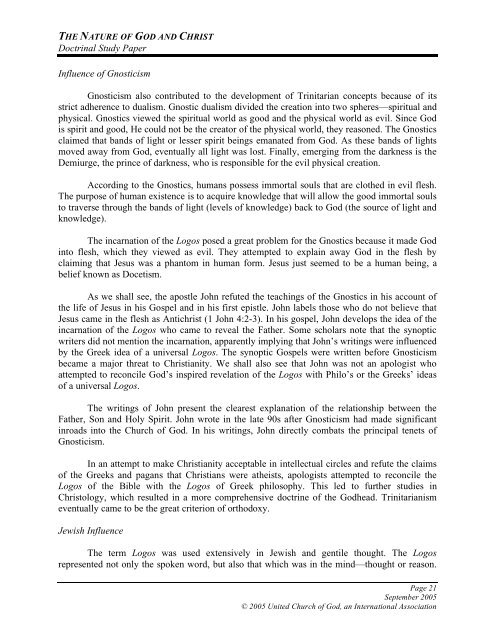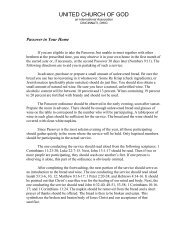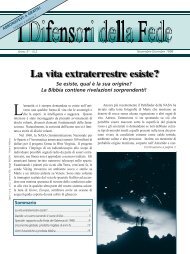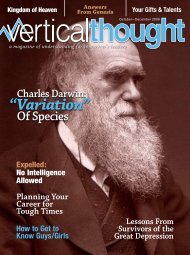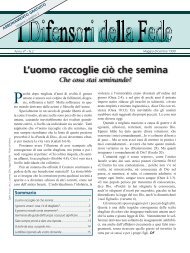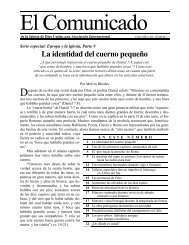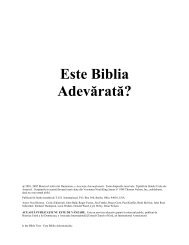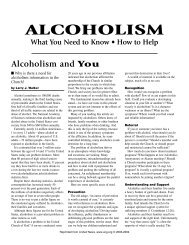The Nature of God and Christ - Members Site - United Church of God
The Nature of God and Christ - Members Site - United Church of God
The Nature of God and Christ - Members Site - United Church of God
- No tags were found...
Create successful ePaper yourself
Turn your PDF publications into a flip-book with our unique Google optimized e-Paper software.
THE NATURE OF GOD AND CHRISTDoctrinal Study PaperInfluence <strong>of</strong> GnosticismGnosticism also contributed to the development <strong>of</strong> Trinitarian concepts because <strong>of</strong> itsstrict adherence to dualism. Gnostic dualism divided the creation into two spheres—spiritual <strong>and</strong>physical. Gnostics viewed the spiritual world as good <strong>and</strong> the physical world as evil. Since <strong>God</strong>is spirit <strong>and</strong> good, He could not be the creator <strong>of</strong> the physical world, they reasoned. <strong>The</strong> Gnosticsclaimed that b<strong>and</strong>s <strong>of</strong> light or lesser spirit beings emanated from <strong>God</strong>. As these b<strong>and</strong>s <strong>of</strong> lightsmoved away from <strong>God</strong>, eventually all light was lost. Finally, emerging from the darkness is theDemiurge, the prince <strong>of</strong> darkness, who is responsible for the evil physical creation.According to the Gnostics, humans possess immortal souls that are clothed in evil flesh.<strong>The</strong> purpose <strong>of</strong> human existence is to acquire knowledge that will allow the good immortal soulsto traverse through the b<strong>and</strong>s <strong>of</strong> light (levels <strong>of</strong> knowledge) back to <strong>God</strong> (the source <strong>of</strong> light <strong>and</strong>knowledge).<strong>The</strong> incarnation <strong>of</strong> the Logos posed a great problem for the Gnostics because it made <strong>God</strong>into flesh, which they viewed as evil. <strong>The</strong>y attempted to explain away <strong>God</strong> in the flesh byclaiming that Jesus was a phantom in human form. Jesus just seemed to be a human being, abelief known as Docetism.As we shall see, the apostle John refuted the teachings <strong>of</strong> the Gnostics in his account <strong>of</strong>the life <strong>of</strong> Jesus in his Gospel <strong>and</strong> in his first epistle. John labels those who do not believe thatJesus came in the flesh as Antichrist (1 John 4:2-3). In his gospel, John develops the idea <strong>of</strong> theincarnation <strong>of</strong> the Logos who came to reveal the Father. Some scholars note that the synopticwriters did not mention the incarnation, apparently implying that John’s writings were influencedby the Greek idea <strong>of</strong> a universal Logos. <strong>The</strong> synoptic Gospels were written before Gnosticismbecame a major threat to <strong>Christ</strong>ianity. We shall also see that John was not an apologist whoattempted to reconcile <strong>God</strong>’s inspired revelation <strong>of</strong> the Logos with Philo’s or the Greeks’ ideas<strong>of</strong> a universal Logos.<strong>The</strong> writings <strong>of</strong> John present the clearest explanation <strong>of</strong> the relationship between theFather, Son <strong>and</strong> Holy Spirit. John wrote in the late 90s after Gnosticism had made significantinroads into the <strong>Church</strong> <strong>of</strong> <strong>God</strong>. In his writings, John directly combats the principal tenets <strong>of</strong>Gnosticism.In an attempt to make <strong>Christ</strong>ianity acceptable in intellectual circles <strong>and</strong> refute the claims<strong>of</strong> the Greeks <strong>and</strong> pagans that <strong>Christ</strong>ians were atheists, apologists attempted to reconcile theLogos <strong>of</strong> the Bible with the Logos <strong>of</strong> Greek philosophy. This led to further studies in<strong>Christ</strong>ology, which resulted in a more comprehensive doctrine <strong>of</strong> the <strong>God</strong>head. Trinitarianismeventually came to be the great criterion <strong>of</strong> orthodoxy.Jewish Influence<strong>The</strong> term Logos was used extensively in Jewish <strong>and</strong> gentile thought. <strong>The</strong> Logosrepresented not only the spoken word, but also that which was in the mind—thought or reason.Page 21September 2005© 2005 <strong>United</strong> <strong>Church</strong> <strong>of</strong> <strong>God</strong>, an International Association


